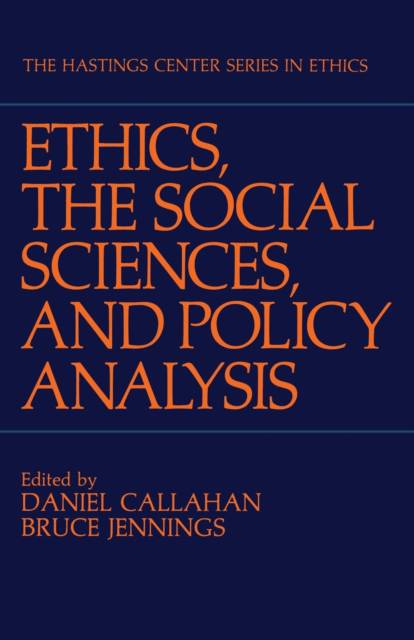
Je cadeautjes zeker op tijd in huis hebben voor de feestdagen? Kom langs in onze winkels en vind het perfecte geschenk!
- Afhalen na 1 uur in een winkel met voorraad
- Gratis thuislevering in België vanaf € 30
- Ruim aanbod met 7 miljoen producten
Je cadeautjes zeker op tijd in huis hebben voor de feestdagen? Kom langs in onze winkels en vind het perfecte geschenk!
- Afhalen na 1 uur in een winkel met voorraad
- Gratis thuislevering in België vanaf € 30
- Ruim aanbod met 7 miljoen producten
Zoeken
Ethics, the Social Sciences, and Policy Analysis
€ 83,95
+ 167 punten
Omschrijving
The social sciences playa variety of multifaceted roles in the policymaking process. So varied are these roles, indeed, that it is futile to talk in the singular about the use of social science in policymaking, as if there were one constant relationship between two fixed and stable entities. Instead, to address this issue sensibly one must talk in the plural about uses of dif- ferent modes of social scientific inquiry for different kinds of policies under various circumstances. In some cases, the influence of social scientific research is direct and tangible, and the connection between the find- ings and the policy is easy to see. In other cases, perhaps most, its influence is indirect-one small piece in a larger mosaic of politics, bargaining, and compromise. Occasionally the findings of social scientific studies are explicitly drawn upon by policymakers in the formation, implementation, or evaluation of particular policies. More often, the categories and theoretical models of social science provide a general background orientation within which policymakers concep- tualize problems and frame policy options. At times, the in- fluence of social scientific work is cognitive and informational in nature; in other instances, policymakers use social science primarily for symbolic and political purposes in order to le- gitimate preestablished goals and strategies. Nonetheless, amid this diversity and variety, troubling general questions persistently arise.
Specificaties
Betrokkenen
- Uitgeverij:
Inhoud
- Aantal bladzijden:
- 381
- Taal:
- Engels
- Reeks:
Eigenschappen
- Productcode (EAN):
- 9781468470178
- Verschijningsdatum:
- 12/12/2012
- Uitvoering:
- Paperback
- Formaat:
- Trade paperback (VS)
- Afmetingen:
- 140 mm x 216 mm
- Gewicht:
- 476 g

Alleen bij Standaard Boekhandel
+ 167 punten op je klantenkaart van Standaard Boekhandel
Beoordelingen
We publiceren alleen reviews die voldoen aan de voorwaarden voor reviews. Bekijk onze voorwaarden voor reviews.








